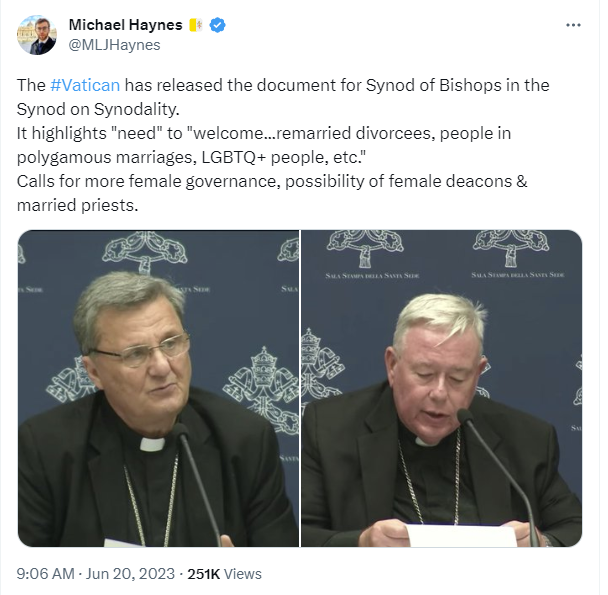
This is part of a collection of rebuttals, responses, and replies. See the index.
What constitutes unity in the church?
One of the repeating themes among critics of the church is that disagreement is the same as disunity and that conformity is the mark of unity. Neither of these are true statements. Anyone who has read the words of Jesus—who brought the ‘sword’ to divide even family members—and Paul—who told the church to cast out those promoting false doctrine—cannot conclude that Christian unity involves complete inclusivity and tolerance. Most people confuse conformity and uniformity with unity, when in fact it is rejection of conformity and uniformity that leads to unity.
Another similar irony is how Protestants emphasize social integration, but Cathodoxy is characterized by more unity. Like Derek (Protestant) is always talking about “unity”, but he’s eager to sacrifice the opportunity for the sake of engaging in polemics, and then justifying this with some religious principle.
— Jack @ Sigma Frame, “
The Mystery of Glorifying a Provision for the Flesh“
(Note:
Anabaptists are not Protestant)
Cathodoxy is characterized by uniformity in its ecumenical structure and conformity in its dogma. Uniformity and conformity are not unity. Despite its outward appearance, Roman Catholicism has many divisions, and a few of them are given below. But, Jack doesn’t want Christians to focus on their divisions. Roman Catholic David Mills also doesn’t want Catholics to focus on their divisions:
I don’t exactly agree with [Scott Hahn and Fr. Martin], though I respect what they’re trying to do.
In the polarized state of Catholic discourse today, that admission of respect is enough for partisans on both sides to throw me in with their other enemies. You have to be all in or you’re out. Worse, you have to be completely against the other side or you’re out. [..] Sometimes they divide people who would not want to be divided, like Pope Francis vs. Pope Benedict and St. John Paul II. Other times they encourage divisions that shouldn’t be encouraged, like “Novus Ordo Catholics” vs. “Traditionalists.” It’s a Catholic version of identity politics.
— David Mills @ Aleteia, “
Opinion: Let’s not talk about Fr. James Martin, Scott Hahn“
Under this view, we are all supposed to set aside our disagreements and polarization. Rather, we should gather together under one big ecumenical tent and act as if these differences do not divide us. This is conformity, not unity. The disagreements still completely exist, we’re just no longer talking about them.
At the core of this particular disagreement is homosexuality. In Part 6 of my series “Reviewing Wright’s Universal Apologia“, John C. Wright used the uniformity of authority of the church—sola ecclesia—to condemn homosexuality for all time:
In other words, something that the main mass of Christian men have always taught and believed, such as abominable nature of sodomy, cannot be in error.
But it turns out the issue is not resolved. Jesuit priest Father James J. Martin SJ’s views on homosexuality are so extreme that the Archbishop Charles Chaput was forced to state that
“Father Martin does not speak with authority on behalf of the Church”, yet Martin has not been reprimanded by the church, which has not ruled infallibly on the homosexuality. We will see below that the Archbishop also does not speak with authority on behalf of the church. I wrote:
If the Pope were to agree with Father Martin and declare [that homosexuality is not a sin] in his full official capacity, the new way would have then always been the teaching of the church, with those teaching otherwise having been in error the whole time.
I continued:
But don’t stop there. If the Pope were to declare that women could become priests, then the dutiful Catholic could not appeal to the full Deposit of Faith and say “Christian men have always taught and believed thus, so this must be in error”.
And of course, if you can’t assert a false doctrine in the future, you can’t do it now. No wonder unity is defined as not talking about disagreements: no Catholic can assert the truth of anything with confidence, because it might well change later.
With this in mind, we now see that the Synod of Bishops on the Synod on Synodality is now pushing for a greater acceptance of homosexuality, married priests, female authority, and female deacons. Where is the unity in the church? This is not unity, unless unity means becoming more like the liberal mainstream Protestants who supposedly lack unity. Curious.

The reality is that fake unity of Roman Catholicism is no better than Protestantism, but is in fact far worse because it deceives people—like Jack or John C. Wright—into believing it has achieved unity. In my discussion on unity in the church in part 11, I said:
Why did Wright find so many Protestants who were not bothered by the concept of denominational divisions? Because by-and-large Protestants choose to respect each other by disagreeing in peace, proving the unity of faith that they do hold in common, just as did Bishop Anicetus towards Polycarp so long ago. Among Protestants, organizational division just isn’t that important. What matters is whether or not their practices are the will of the Father, not obedience to denominational hierarchy.
Uniformity can never produce unity. Despite the alleged superiority of having a single human head atop a hierarchical church organization, Roman Catholicism remains unable to explain to its congregants what they must believe. Under Roman Catholicism’s façade of uniformity hides disunity. All the supposed benefits of Roman Catholicism’s ecclesiastical structure avail nothing.
Roman Catholicism has only infallibly interpreted
seven passages. There is no official list of ecumenical church councils upon which all Roman Catholics can agree upon. There is no official list of infallible teachings. Indeed, when Papal Infallibility was defined, the Catechism of the Catholic Church had to be updated to remove the newly created contradiction.
By contrast, I argued that the Church of Christ is already unified:
It is my assertion the Christians who do the will of the Father are indeed united and that these Christians can be found in all places, especially in those churches that Wright and Roman Catholicism has rejected. Many of those theological and hierarchical differences are merely matters of tradition and personal conviction. They indicate a lack of uniformity, even as it shows our unity. As Irenaeus once stated, it is our ability to live in peace with our brothers and sisters in Christ that proves our agreement in the faith.
I have found these Christians in all places, in many different denominations. I’ve successfully worshiped on many occasions with other Christians with whom I disagree on matters of tradition and personal conviction. I’ve even attended church services
where the pastor was a woman. Indeed, as Ed Hurst recently wrote in “
Dealing with Allies“:
Basic rule: Emphasize common ground. [..] Take your exclusivity somewhere else. We are walking by our convictions, and your convictions are your problem. Following Christ is not a question of objective right or wrong.
I agree with him in general. My “polemics” are designed to divide only that which must be divided and to unify all that which should and can be unified. I draw the line where the Word of God draws the line. That is the only justification of religious principles that I need or desire.
Consider all the polemics that I do not write, the ones pertaining to matters of personal conviction. Even Ed Hurst, in “There is No Sacrament“, shows how to divide right and wrong. He may do so in far fewer words and with no debate or discussion, but he does so nonetheless. When it comes to Roman Catholicism, the Bible is clear that it must be utterly rejected, and so I must write against it. But on matters of personal conviction, I need not write against them at all.
The reality is that Christians have long had unity, but people have been looking for unity in church hierarchy. By assuming the Roman Catholic apostolicity—the axiom sola ecclesia—they define unity as the universality of church structure. Atheists who criticize Christianity because Protestants have so many denominations are implicitly accepting the Roman Catholic frame of “One Church, Alone.” But the Protestatant apostolicity—sola scriptura—defines unity by one’s adherence to the Word of God, which has plenty of room for convictions.



Pingback: Meta Cognitions | Σ Frame
Pingback: The Diocese of Egypt